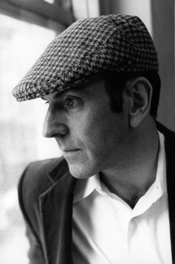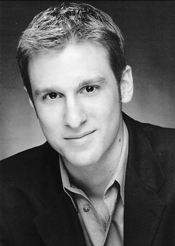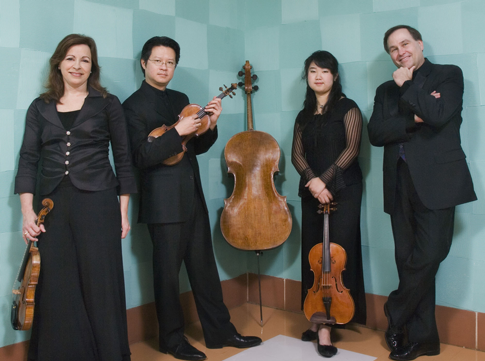
22 Jul 2008
Gordon creates masterpiece in “Green Sneakers”
Eugenia Zukerman asked for a 10-minute chamber work — a piano quintet, perhaps — and she got Green Sneakers for Baritone, String Quartet and Empty Chair, which lasts exactly an hour.
English Touring Opera are delighted to announce a season of lyric monodramas to tour nationally from October to December. The season features music for solo singer and piano by Argento, Britten, Tippett and Shostakovich with a bold and inventive approach to making opera during social distancing.
This tenth of ten Live from London concerts was in fact a recorded live performance from California. It was no less enjoyable for that, and it was also uplifting to learn that this wasn’t in fact the ‘last’ LfL event that we will be able to enjoy, courtesy of VOCES8 and their fellow vocal ensembles (more below …).
Ever since Wigmore Hall announced their superb series of autumn concerts, all streamed live and available free of charge, I’d been looking forward to this song recital by Ian Bostridge and Imogen Cooper.
Although Stile Antico’s programme article for their Live from London recital introduced their selection from the many treasures of the English Renaissance in the context of the theological debates and upheavals of the Tudor and Elizabethan years, their performance was more evocative of private chamber music than of public liturgy.
Evidently, face masks don’t stifle appreciative “Bravo!”s. And, reducing audience numbers doesn’t lower the volume of such acclamations. For, the audience at Wigmore Hall gave soprano Elizabeth Llewellyn and pianist Simon Lepper a greatly deserved warm reception and hearty response following this lunchtime recital of late-Romantic song.
For this week’s Live from London vocal recital we moved from the home of VOCES8, St Anne and St Agnes in the City of London, to Kings Place, where The Sixteen - who have been associate artists at the venue for some time - presented a programme of music and words bound together by the theme of ‘reflection’.
'Such is your divine Disposation that both you excellently understand, and royally entertaine the Exercise of Musicke.’
‘And there was war in heaven: Michael and his angels fought against the dragon; and the dragon fought and his angels, And prevailed not; neither was their place found any more in heaven … that old serpent … Satan, which deceiveth the whole world: he was cast out into the earth, and his angels were cast out with him.’
There was never any doubt that the fifth of the twelve Met Stars Live in Concert broadcasts was going to be a palpably intense and vivid event, as well as a musically stunning and theatrically enervating experience.
‘Love’ was the theme for this Live from London performance by Apollo5. Given the complexity and diversity of that human emotion, and Apollo5’s reputation for versatility and diverse repertoire, ranging from Renaissance choral music to jazz, from contemporary classical works to popular song, it was no surprise that their programme spanned 500 years and several musical styles.
The Academy of St Martin in the Fields have titled their autumn series of eight concerts - which are taking place at 5pm and 7.30pm on two Saturdays each month at their home venue in Trafalgar Square, and being filmed for streaming the following Thursday - ‘re:connect’.
The London Symphony Orchestra opened their Autumn 2020 season with a homage to Oliver Knussen, who died at the age of 66 in July 2018. The programme traced a national musical lineage through the twentieth century, from Britten to Knussen, on to Mark-Anthony Turnage, and entwining the LSO and Rattle too.
With the Live from London digital vocal festival entering the second half of the series, the festival’s host, VOCES8, returned to their home at St Annes and St Agnes in the City of London to present a sequence of ‘Choral Dances’ - vocal music inspired by dance, embracing diverse genres from the Renaissance madrigal to swing jazz.
Just a few unison string wriggles from the opening of Mozart’s overture to Le nozze di Figaro are enough to make any opera-lover perch on the edge of their seat, in excited anticipation of the drama in music to come, so there could be no other curtain-raiser for this Gala Concert at the Royal Opera House, the latest instalment from ‘their House’ to ‘our houses’.
"Before the ending of the day, creator of all things, we pray that, with your accustomed mercy, you may watch over us."
The doors at The Metropolitan Opera will not open to live audiences until 2021 at the earliest, and the likelihood of normal operatic life resuming in cities around the world looks but a distant dream at present. But, while we may not be invited from our homes into the opera house for some time yet, with its free daily screenings of past productions and its pay-per-view Met Stars Live in Concert series, the Met continues to bring opera into our homes.
Music-making at this year’s Grange Festival Opera may have fallen silent in June and July, but the country house and extensive grounds of The Grange provided an ideal setting for a weekend of twelve specially conceived ‘promenade’ performances encompassing music and dance.
There’s a “slide of harmony” and “all the bones leave your body at that moment and you collapse to the floor, it’s so extraordinary.”
“Music for a while, shall all your cares beguile.”
The hum of bees rising from myriad scented blooms; gentle strains of birdsong; the cheerful chatter of picnickers beside a still lake; decorous thwacks of leather on willow; song and music floating through the warm evening air.

Eugenia Zukerman asked for a 10-minute chamber work — a piano quintet, perhaps — and she got Green Sneakers for Baritone, String Quartet and Empty Chair, which lasts exactly an hour.
She was delighted — as were all those who heard the world premiere of “Sneakers” at Colorado’s Bravo! Vail Valley Music Festival on July 15.
“I met Ricky two years ago,” says Zukerman, who as its artistic director had invited Gordon to be 2008 composer-in-residence at the Festival. “I had heard his Orpheus & Euridice, and he wrote me a flute obbligato for several of his songs. I was eager to have him in Vail and to commission a new work by him.”
In September, however, Gordon called Zukerman; he said he was working on a big piece and could not stop. “He read me the poems that were the libretto for the work,” Zukerman says. “They were gripping. I told him we would do it!”
Zukerman first contacted Gordon about a year ago, when he was in Salt Lake City for the second production of his opera The Grapes Of Wrath. At the time she suggested collaboration with the Miami String Quartet, an ensemble with a long Vail association. Gordon remembered a set of poems that he had written following the AIDS death of his long-time companion Jeffrey Grossi in 1996. He saw a new score taking shape on stage around an empty chair.
“I had a sense of the atmosphere that the work would have,” says the composer, who goes on to explain the title. There was a day after Jeffrey’s death when I was staring into our closet from the vast desolation of our bed,” he says. “These sad little green sneakers suggested a text about the day we bought them together. It poured out of me and ended up a cycle of poems that tells the story of that day and the period after it — all the way up to Jeffrey’s death.”
 Jesse Blumberg
Jesse Blumberg
Gordon knew that the vocalist for Sneakers had to be Jesse
Blumberg, the baritone who had created the role of Connie Rivers, the wayward
husband of Steinbeck’s pregnant Rosasharn, for the premiere of
Grapes a year earlier at Minnesota Opera. “In watching rehearsals
of Grapes I noted Jesse’s artistry — his charisma, his honesty and his
simplicity as a performer,” Gordon says. “Because of the honesty and
intimacy of these poems I knew that a performer who was false in any way
would kill Sneakers. It had to be a singer who was essentially an
open vessel. Jesse is like that with his unusual combination of strapping
casual masculinity and comfort in his own body. He’s unsaddled by any kind
of ego that gets between him, the music he is singing and the words he is
conveying.”
Gordon sent Blumberg the texts and asked whether he would be willing to perform Sneakers. “He wrote back almost immediately that he would be honored,” the composer says. “I am honored to have him.”
Gordon compares Blumberg with veteran mezzo Frederica Von Stade. “Like her, Jesse has a quality that many great singers have.” he says. “It is the inability to sing a single note without imbuing it with his entire personality, his opinion about life. Each note screams with life and dances.”
Green Sneakers originally ended with “Provincetown,” a poem that documents Gordon’s search for others who had survived the loss of a lover. But, once at work on the new score, he added as an epilogue “Sleep,” a poem (or lullaby) that he had once written for Grossi as a birthday gift. “I wanted to end the piece with a lullaby,” Gordon says, “and with a celebration of what we had together.” Grossi’s death is an experience that the composer had treated in his 2005 song cycle Orpheus & Euridice.
In Sneakers, however, the objectifying veil of myth is absent. Here Gordon faces Death head-on. The immediacy of the first person makes the narrative overwhelmingly direct. “I have questioned whether this was the right thing to do — to tell a story this baldly and to expose myself and my life with Jeffrey this way,” the composer says. “And my explanation is that after Jeffrey died I sought solace in reading everything I could find about grief. I was grateful to those who were generous enough to reveal in great detail the ways in which they endured loss and bore their own tragedies. So maybe there is a sense of mission here. Perhaps others have gone through what I went through and this might bring them some peace, identification, or understanding.”
 Miami String Quartet (Photo by Paul McGuirk)
Miami String Quartet (Photo by Paul McGuirk)
It is amazing that in this his first work for string quartet Gordon has
perfected an idiom that goes to the edge of tonality to create a microcosm of
pain and despair that has all the markings of a contemporary
Gesamtkunstwerk. Indeed, at the premier, members of the Miami String
Quartet were no longer mere strings, but humanized voices that formed a
seamless dramatic unity with Blumberg. Yet, despite its obvious personal
intensity, Sneakers is in no way confessional.
Like Orpheus, but in its own way, the new work elevates its contents to the level of universality. There is nothing of “letting it all hang out” in the score. Gordon locates models in Handel’s cantata Lucretia and in Britten’s Phedre, pieces where one singer tells and lives the story simultaneously. Because of its intimacy I approached the story in a ‘classical’ way with a prologue, an epilogue and interludes throughout,” he says. “That not only gives the listener time to think and reflect, but also gives the performer space to gear up for the next event. Even the use of a string quartet felt like a slightly distancing formal device.”
Praised for his Monteverdi and Bach, Blumberg at the premiere made this story his own, singing with a richly nuanced voice and, at 29, the stage presence of a veteran actor. In the most wrenching moment of Sneakers he went to the piano and played a phrase before turning to the epilogue of Gordon’s libretto. “This introduces the epilogue,” Gordon says. “In the score, there are two versions. One is very easy, essentially for two fingers, which any singer could play. The strings come in softly under the piano and take over when the singer leaves the keyboard. There’s the harder version, which is the one Jesse bravely opted for. He played the introduction to the epilogue, which, if the singer had no piano skills, would be hard, but luckily, with Jesse, you get everything. That’s why I hope it is he who does many productions of this piece, because along with being a wonderful singer and artist, he is brave!”
On the printed page Sneakers is a traditional song cycle: 14 free-verse poems plus two instrumental sections. The total absence of stage directions calls for a director, whom Gordon found for the premiere in Jonathan Solari, whose previous experience has been largely in spoken theater. “It was my job to support what Ricky had written,” says Solari, who went to work on the piece with Blumberg in Gordon’s New York apartment weeks before coming to Vail. We pushed the furniture aside and sat down with the music to develop a staging that peers into the soul of the narrator,” he says. Solari focused on having Blumberg interact with the string quartet and he wanted the audience to have an image of Jeffrey in the vacant chair on stage.
Where does Sneakers leave Gordon, a dozen years after Grossi’s death? Is this closure? “No, it’s not closure,” the composer says, “but a kind of unbelievable fulfillment, as if I have made something out of an experience that was excruciatingly painful as well as exultingly joyous. For what kept me alive — and probably Jeffrey for longer than anyone expected him to live — was a tremendous love, for which I will always be grateful and treasure as my good fortune.”
With the repetition of “Sleep Dear,” the final words of Green Sneakers, one heard in Vail a distant echo of the “Ewig” that concludes Mahler’s monumental Abschied. For this is a song of today’s earth, a farewell lamentation that transcends death.
Wes Blomster